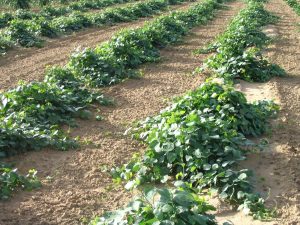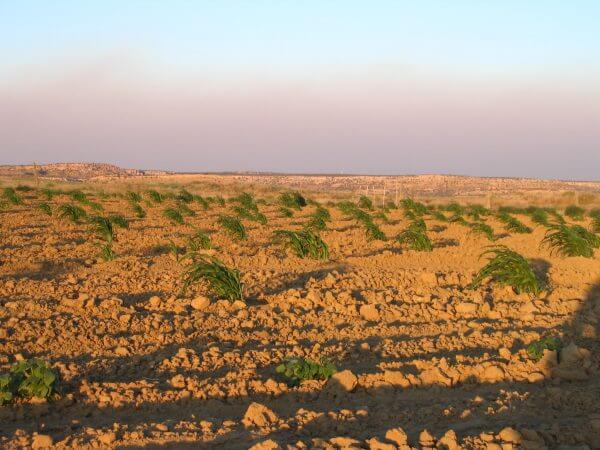The Hopi Reservation is located in northern Arizona, about 100 miles northeast of Flagstaff. It consists of more than 2,500 square miles, all located within the boundaries of the Navajo Nation. Some 8,000 of the Hopi Tribe’s 12,000 enrolled members live on the reservation.
Activities
Hopi Reservation Extension works with Hopi Tribal Government partners such as the Office of Range Management and the Hopi Office of Youth Affairs, and with non-governmental partners such as the Hopi Pu’tavi Project and the Natwani Coalition to improve community capacities in the areas of natural resource management, community development, youth education and improved nutrition for disease prevention. Extension supports Hopi livestock production, traditional farming, home gardening and youth education.

Highlights
MEASURING IMPACT
-
“…with the help of the FRTEP program….we got the (Hopi 4-H) charter approved through the state. We now have a Hopi Healthy Living Ambassadors Program that is offered to high school students. We now have the Robotics 101 and the STEM University. We now have a path and a vision, and some goals that we are working on to help move the 4-H program forward again, and bring it alive and vibrant.”
-
“Because (the agent) is a Community Member, a Tribal Member and lives here, she understands and knows most of the ins and outs of what we all live with out here, so that’s been very, very helpful and impactful.”
FRTEP programs have had a major impact on individuals, families and tribal communities. Just how much impact has now been quantified thanks to a research project that used Ripple Effects Mapping (REM) and content analysis. The Indian Land Tenure Foundation (ILTF) engaged in a joint collaboration with an evaluation team and the Western Extension Risk Management Education Center to measure the long-term impacts of the Federally Recognized Tribal Extension Program (FRTEP) serving the Hopi Reservation. Click the link below to read the report.
Youth food and nutrition
The Hopi have existed on the mesas of northern Arizona for centuries, depending on farming and knowledge of their land for survival. Hopi culture today is still dependent on this knowledge passed down from their elders. Traditional foods are required for participation in traditional Hopi life, and are a healthier alternative to modern processed foods. The Hopi Traditional Foods program is part of the wellness response to tribal priorities for the health of their children.
Range management
Extension works with the Hopi Office of Range Management to help provide education and assistance to livestock producers. Workshops are held covering such topics as Beef Quality Assurance, low-stress livestock handling, record keeping, ranch safety and agriculture risk management. Extension is seen as a valuable resource among producers on the reservation.
New programs
Hopi Extension is launching a 4-H program that will provide opportunities for youth to learn life skills and gain knowledge while having fun. 4-H programs are designed to fortify and revitalize agricultural and natural resource practices, develop 4-H youth leadership opportunities and strengthen families. Other new programs in development include school and community gardens and renewable energy.
COVID-19 Activities
- Helped facilitate the purchase and delivery of 350 bales of hay for Hopi ranchers unable to leave the reservation due to travel restrictions.
- Helped facilitate the purchase of four truckloads of wood for the Hopi community needed for heating homes and cooking.
- Offered Zoom classes on gardening for community members, and supported gardeners via texts and phone calls.
- Offered weekly Zoom classes on health and fitness for youth.
- Helped to identify cattle vaccination resources for Hopi ranchers.
- Provided online classes on the canning of food.
Local Farmers and Hopi Food Leaders Work to Feed Their Communities Amid Pandemic and Climate Change
Jan. 27, 2021 – Story by Eleanor Bennett, Aspen Public Radio
With the ongoing drought in Pitkin, Eagle and Garfield counties and across most of the West, growing food and raising livestock is becoming more difficult. At the same time, the pandemic is exacerbating inequalities in the Roaring Fork Valley and many locals are still out of work, making it hard to access fresh, healthy food.
“The pandemic has shown us the inequity and inequality that we have in our country when it comes to food,” said Susan Sekaquaptewa, the Assistant Agent for the Federally Recognized Tribal Extension Program at the University of Arizona. “Good, healthy food is very hard and expensive for a lot of people in the country to have and it really shouldn’t be that way.”
Sekaquaptewa lives on the Hopi Reservation in northeastern Arizona where she teaches gardening, seed saving and food preservation to families in her community.
“In the Hopi community we’ve been pretty self-sustainable when it came to our food system up until probably the last hundred years,” she said.
Sekaquaptewa gave a recent virtual presentation on the connection between “food sustainability” and Hopi food traditions as part of this year’s Naturalist Nights winter speaker series hosted by Aspen Center for Environmental Studies (ACES), Wilderness Workshop and Roaring Fork Audubon.
“Food sustainability really just means having enough food for everyone to eat,” Sekaquaptewa said during the presentation. “It’s about a connection to the landscape that you live in and knowing where your food comes from.”
That kind of connection goes beyond just giving out food, it extends to creating a more equitable system where local farmers and ranchers are supported and people are able to afford healthy food.
According to Sekaquaptewa, merging traditional growing methods — like Hopi “dry farming” where crops are grown without irrigation — with Western-based science education can help communities achieve food sustainability and is crucial in overcoming the dual crises of climate change and a broken food system.
“In my lifetime, I cannot believe I can see the difference of less snow and rain and moisture, which really impacts not just growing food, but the grasses, which impacts the cows, which impacts the birds,” Sekaquaptewa said. “It’s really all connected and so that worries me.”
Sekaquaptewa hopes to inspire Valley locals to look at their own food heritage and history for solutions to things like climate change and inequality. And that’s exactly what ACES’ Rock Bottom Ranch in the mid-valley is striving to do with their “regenerative agriculture” practices.
“Indigenous communities were the initial stewards of the land and a lot of regenerative agriculture practices stem from indigenous practices,” said Alyssa Barsanti, the Agriculture Manager at the ranch. “People are realizing that these methods have been around for a long time and they’ve been uncredited.”
Over the years, Barsanti said ACES and the Rock Bottom Ranch staff have continued to look at what was done on the land they now cultivate by people before them.
“We look to those practices because this land was fertile and healthy back when indigenous communities were stewarding it,” she said.
For example, the ranch uses “diversity, rotation and rest” practices with their livestock that were used successfully by Utes and other indigenous communities as ways of hunting, gathering and growing food in the area.
And as Sekaquaptewa proposed in her talk, they are working to merge these traditional methods with Western-based science to produce more food for the community, regenerate the land and reduce the impact of climate change.
By doing things like limiting the number of cows and livestock on the land and rotating them frequently, Barsanti said they’re managing the animals’ grazing habits to improve the soil and keep the grass in a vegetative state, which sequesters more carbon than if the grass were overgrazed or not grazed at all. This can also help offset the dangerous greenhouse gas, methane, that cows emit into the atmosphere when they belch.
“The goal in regenerative agriculture is to make the land better than it was,” she said. “At Rock Bottom Ranch we definitely believe that livestock are a powerful tool to help regenerate lands and bring them to their highest producing levels.”
In the past six years since she started at the ranch, Barsanti has noticed a decline in snow and rainfall as well as consistently earlier frost dates in August or September, which kills outdoor crops.
“Farming really brings you close to the land, the animals and the weather and you pay attention to every detail of precipitation and frost and all these things,” Barsanti said.
That closeness to the land also informs Rock Bottom Ranch’s approach to addressing inequality in the food system.
“We look at our land and our pasture health and our soil and the capacity of the land to figure out how much food and what food we can grow and raise,” Barsanti said. “And we found that with healthier pastures, you can produce more off the land and feed more people.”
For the past several years, the ranch has been working with the Colorado-based organization, UpRoot, to glean their surplus crops for local food pantries and humanitarian groups like Lift-Up.
They also started a live meat-chicken program with the Latinx community last summer. The ranch regularly sells their retired laying hens for a discounted price to community members who have backyard flocks, and in recent years they noticed an increasing number of people were actually taking them home to slaughter.
“We recognized a growing interest among our Latinx community in buying live chickens because of the cultural connection of being able to slaughter at home and prepare the animal,” Barsanti said. “So we decided that it would be a way more exciting product if we could raise meat chickens and sell them live.”
By creating programs that reconnect people with their food heritage and the land, Sekaquaptewa, Barsanti and the Rock Bottom Ranch team are part of a growing movement of people working to ensure everyone has equal access to food.

Contact Information
Susan Sekaquaptewa – Extension Educator
Phone Number
928-734-3708
sks2@email.arizona.edu